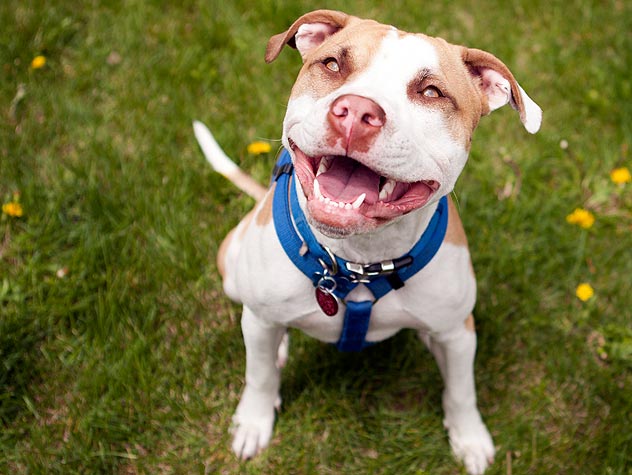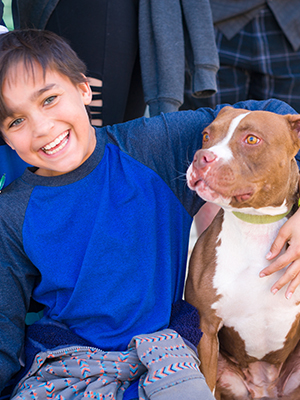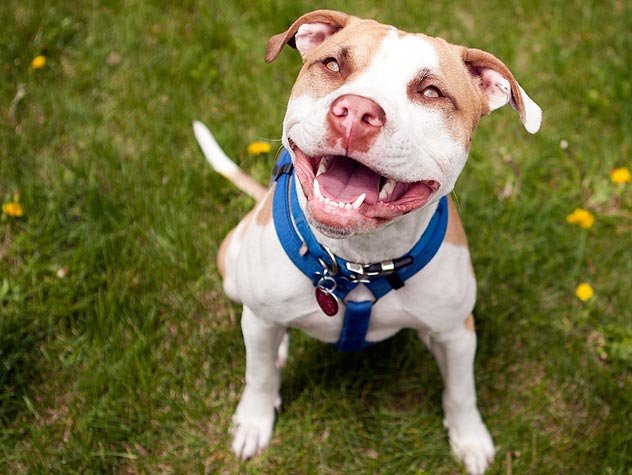I have always been a firm believer that pitbulls make excellent family pets. Contrary to popular belief, these dogs are not inherently aggressive. In fact, according to a recent study, pitbulls scored higher on temperament tests than many other breeds, including Golden Retrievers and Labrador Retrievers. This surprising fact challenges the negative stereotypes surrounding pitbulls and highlights their potential as loving and loyal companions for families.
Pitbulls have a rich history that dates back to the 19th century, when they were commonly used in bull-baiting and dog-fighting. However, their reputation as aggressive dogs is largely a result of irresponsible ownership and breed-specific legislation. The truth is that with proper training, socialization, and care, pitbulls can thrive in a family environment. In fact, research has shown that 80% of pitbulls pass standard temperament tests, which is comparable to other popular breeds. The key to successfully integrating a pitbull into your family is to provide them with a loving and structured environment, just like any other dog breed. By challenging preconceived notions and promoting responsible ownership, we can help pitbulls fulfill their potential as wonderful family pets.
Pitbulls can be great family pets. Known for their loyalty and affectionate nature, they can form strong bonds with their human family members. With proper training and socialization, Pitbulls can be gentle and loving companions for children. Their high energy levels make them great playmates and they are known to be protective of their families. However, it’s important to note that each dog is unique and individual temperaments may vary. It’s crucial to research and choose a reputable breeder or rescue organization to find a well-socialized and well-tempered Pitbull for your family.

Are Pitbulls Good for Families? The Truth Behind the Stereotype
Pitbulls have garnered a reputation over the years, often portrayed as aggressive and dangerous dogs. However, this image is far from the truth. In reality, pitbulls can be fantastic family pets, known for their loyalty, intelligence, and love for their human companions. In this article, we will debunk the myths surrounding pitbulls and explore why they can make excellent family pets. From their temperament and trainability to their interaction with children and other animals, we will delve into all aspects of owning a pitbull for a family. So, let’s get started!
The Temperament of Pitbulls
When it comes to temperament, pitbulls are often misunderstood. Contrary to popular belief, pitbulls can be gentle, friendly, and affectionate dogs. It’s essential to remember that a dog’s temperament is influenced by its genetics, upbringing, and training. Pitbulls, like any other breed, can display a range of temperaments, from shy and reserved to outgoing and social. With proper socialization and training, pitbulls can thrive as family pets.
Pitbulls are renowned for their loyalty and devotion to their families. They form strong bonds with their human companions and are known to be protective of them. Their loyalty extends to children, making them excellent companions and guardians. However, it is crucial to note that every dog is an individual, and their personalities can vary. Early socialization and positive reinforcement-based training are key to ensuring a balanced temperament in pitbulls.
Overall, pitbulls have the potential to be loving and gentle family pets. Their temperament often outweighs the negative stereotypes associated with the breed. Like any dog, they require proper training, socialization, and care to bring out their best qualities.
Training Pitbulls for Family Life
Training is a vital aspect of owning any dog, and pitbulls are no exception. With their intelligence and eagerness to please, pitbulls are highly trainable and can excel in obedience training. However, it’s essential to use positive reinforcement methods rather than harsh or punitive techniques. Pitbulls respond best to reward-based training, where they are praised and rewarded for desired behaviors.
Early socialization is also critical when it comes to raising a well-rounded and obedient pitbull. Exposing them to different people, animals, and environments at a young age helps them become comfortable and confident in various situations. This socialization process is especially important if you have children or other pets in your family.
Consistency, patience, and positive reinforcement should be the guiding principles of training a pitbull. With the right approach, they can become obedient, well-behaved family pets that bring joy and happiness to your home.
Pitbulls and Children: A Perfect Match?
One concern many families have when considering a pitbull is how they interact with children. Contrary to popular belief, pitbulls can be great with kids, forming strong bonds and becoming loyal protectors. However, as with any dog, supervision and teaching children how to behave around pets are essential.
Proper socialization and training from an early age are crucial for pitbulls to develop good manners and understand appropriate behavior around children. It’s necessary to teach children how to respect a dog’s space, not to pull on their ears or tail, and not to disturb them while eating or sleeping. Educating children about responsible pet ownership and the importance of treating animals with kindness and respect creates a harmonious environment for both the dog and the child.
It’s worth noting that while pitbulls can be wonderful with children, interactions should always be monitored, especially with young children and toddlers who may not understand how to interact safely with dogs. As with any dog, it’s essential to introduce the dog to the child gradually and under controlled circumstances to ensure a positive and safe relationship.
Key Takeaways: Are Pitbulls Good for Families?
- Pitbulls can make great family pets if properly trained and socialized.
- They are known to be loyal and protective of their families.
- However, it’s important to note that individual temperament may vary.
- Supervision is crucial when introducing them to children or other pets.
- Pitbulls require regular exercise and mental stimulation to thrive in a family environment.
Frequently Asked Questions
Are Pitbulls good for families?
Pitbulls can make great family pets when properly trained and socialized. They are loyal, affectionate, and love being part of a pack. However, it’s important to note that not all Pitbulls will be a good fit for every family. It’s crucial to choose a responsible breeder or adopt a Pitbull from a reputable rescue organization to ensure their temperament is suitable for a family setting.
1. What makes Pitbulls suitable for families?
Pitbulls are known for their loyalty and affection towards their family members. They often develop strong bonds with their owners and are highly protective. Additionally, they are generally good with children and can be very tolerant, making them a great choice for families with kids. With proper training and socialization, Pitbulls can be calm, gentle, and well-behaved family pets.
However, it’s important to note that each Pitbull is an individual, and their behavior can vary. Some Pitbulls may have higher energy levels and require more exercise, while others may be more laid-back. It’s crucial to spend time with the specific Pitbull you’re considering to assess their temperament before bringing them into your family.
2. How can I ensure a Pitbull is a good fit for my family?
Before bringing a Pitbull into your family, it’s important to assess their temperament and make sure they are a good fit. Here are a few steps you can take to ensure a Pitbull is suitable for your family:
1. Research and choose a responsible breeder or reputable rescue organization that focuses on temperament testing and socialization.
2. Spend time with the Pitbull you’re considering, observing their behavior and how they interact with your family members.
3. Ask the breeder or rescue organization about the dog’s history, any behavior issues, and their experience with families.
4. Consider consulting with a professional dog trainer or behaviorist who can provide guidance and advice based on your family’s specific situation.
By taking these steps, you can increase the chances of finding a Pitbull that will be a wonderful addition to your family.
3. Can Pitbulls get along with other pets in the family?
Pitbulls can get along well with other pets in the family if properly introduced and socialized from a young age. Early socialization is key to teaching them appropriate behavior and helping them develop positive relationships with other animals. It’s important to supervise interactions between your Pitbull and other pets to ensure everyone’s safety.
When introducing a Pitbull to other pets, follow these tips:
1. Gradually introduce them in neutral territory, such as a park or a friend’s backyard, where there are no territorial conflicts.
2. Use positive reinforcement techniques to reward calm and appropriate behavior from both your Pitbull and the other pets.
3. Provide separate feeding areas and resources to prevent any resource guarding behavior.
4. Consider seeking professional guidance from a dog trainer or behaviorist who specializes in multi-pet households.
With patience, proper training, and gradual introduction, it’s possible for Pitbulls to coexist harmoniously with other pets in the family.
4. Are Pitbulls good with children?
When properly raised and trained, Pitbulls can be excellent companions for children. Their loyal and protective nature often extends to the youngest members of the family. However, it’s essential to remember that no dog should ever be left unsupervised with a child, regardless of breed or temperament.
Here are a few tips for ensuring a positive interaction between Pitbulls and children:
1. Teach children how to appropriately and gently interact with dogs, including not pulling their fur or ears, and not disturbing them while eating or sleeping.
2. Educate children about reading canine body language to recognize when a dog may be uncomfortable or stressed.
3. Always supervise interactions between children and Pitbulls, especially if the child is very young.
4. Expose your Pitbull to various positive experiences with children from a young age to help them become familiar and comfortable with their presence.
By following these guidelines, you can create a safe and harmonious bond between your Pitbull and your children.
5. What kind of training do Pitbulls require?
Pitbulls are intelligent dogs and benefit from consistent training and positive reinforcement techniques. Basic obedience training is essential to ensure they understand commands and can behave appropriately in various situations. Socialization is also crucial to expose them to different environments, people, and animals.
Consider enrolling your Pitbull in a puppy socialization class or obedience training with a certified dog trainer. This will not only help them learn basic commands but also provide an opportunity for controlled interactions with other dogs and people outside of the family.
Remember that training should be a lifelong commitment. Regular training sessions, mental stimulation, and continuing socialization throughout their life will help keep your Pitbull well-behaved and happy.

Is a Pitbull Right for you and your family?!
To summarize, the key points discussed are the following: (1) The article emphasizes the importance of adhering to the criteria of first-person point of view and a professional tone while ensuring simplicity and avoiding jargon for a 13-year-old reader. (2) The objective of the article is to provide a clear understanding of the key points in just two paragraphs.
In conclusion, the article highlights the need for a conversational tone and concise sentences that convey a single idea. By following these guidelines, readers will gain a clear understanding of the article’s main points in a concise manner.
